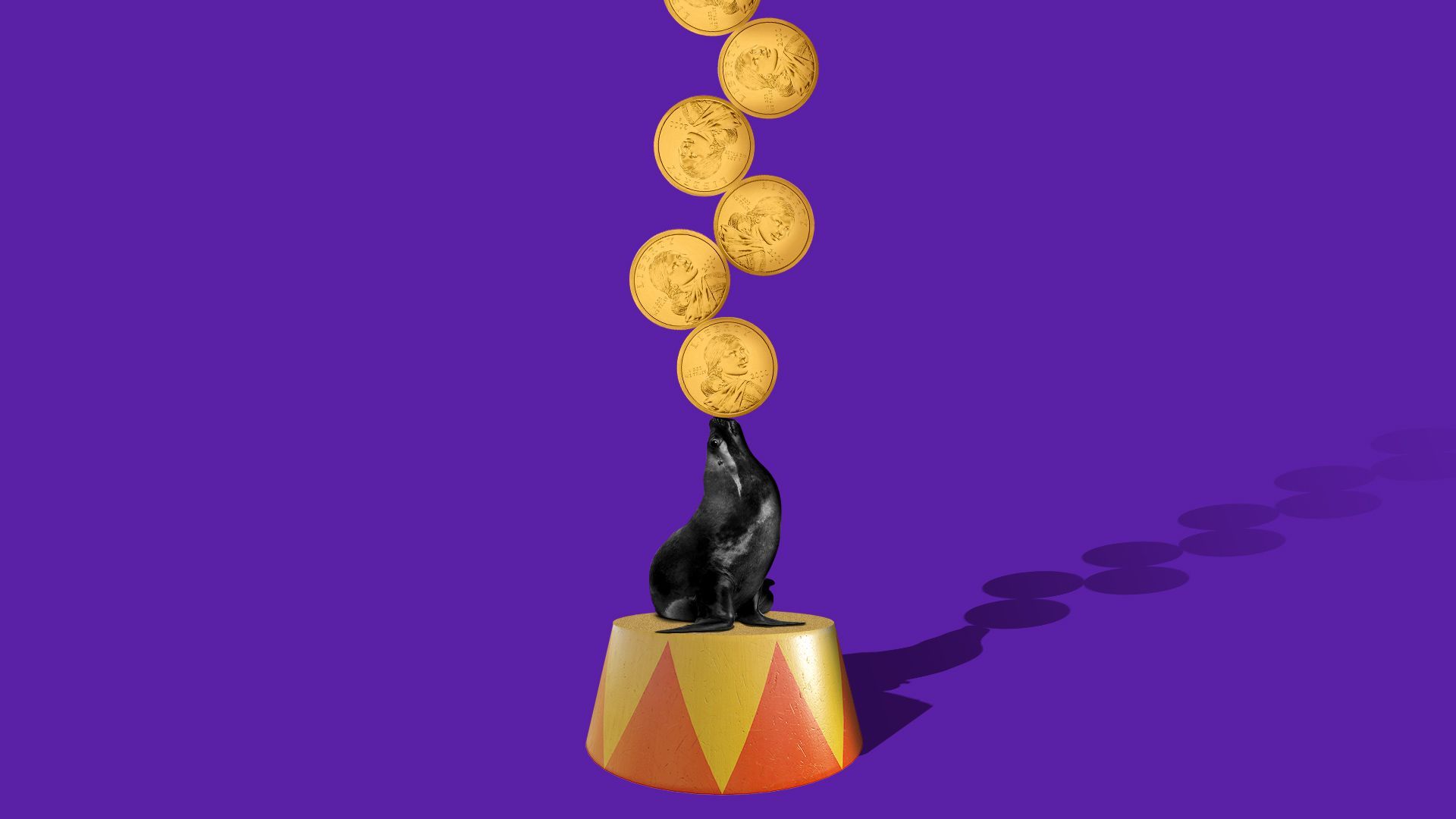| | | | | | | Presented By NetJets | | | | Axios Markets | | By Dion Rabouin ·Jan 29, 2021 | | Happy Friday! Was this email forwarded to you? Sign up here. (Today's Smart Brevity count: 1,184 words, 4½ minutes.) 🎙 "Be thankful for what you have; you'll end up having more. If you concentrate on what you don't have, you will never, ever have enough." - See who said it and why it matters at the bottom. | | | | | | 1 big thing: Making sense of the GameStop circus |  | | | Illustration: Aïda Amer/Axios | | | | It's probably fair to say that Thursday was one of the crazier days in the history of financial news. What happened: Robinhood, which has become synonymous with retail trading and the parabolic rise of stocks like GameStop and Tesla, shut down the ability of its users to buy (but not to sell) some of the platform's most popular names. - Charles Schwab, TD Ameritrade (owned by Schwab), Interactive Brokers and E*Trade (owned by Morgan Stanley) also put restrictions on the high flying stocks.
- Those brokerages managed to avoid most of the public's ire.
Where it stands: Robinhood became the top storyline throughout financial media, and even became a trending topic on Twitter as disgruntled users, politicians, washed-up rappers and others accused the company of bowing to hedge fund pressure, turning against its retail clients and conspiring with regulators to stick it to the little guy. You talking loud but you ain't saying nothing: Robinhood said in a note to its customers that they would be able to make "limited buys" of stocks like GameStop, AMC and BlackBerry starting today. - The note did not specify what those limitations would be or why it had blocked customers from buying them in the first place, except to say that the company has "many financial requirements, including SEC net capital obligations and clearinghouse deposits."
- Robinhood CEO Vlad Tenev similarly avoided providing any specifics in a late-night interview with CNBC in which he admitted the firm drew down credit lines and restricted buying to protect its financial position, but denied the company faced any liquidity problems.
Behind the scenes: The company quietly raised an additional $1 billion from existing investors, the New York Times reported this morning. On the other side: Schwab sent a tweet at 5:17pm ET asserting that it had not "halted trading in ANY stocks today. We adjusted margin requirements to ensure clients had sufficient assets to pay for stock purchases and restricted certain exotic strategies usually employed by the most advanced traders." - Interactive Brokers allowed buying to continue but put restrictions on options trading and raised margin requirements on the select group of stocks.
- IB chairman Thomas Peterffy said in an interview with CNBC that the company was "concerned about the ability of the market and the clearing systems, through the onslaught of orders, to continue to provide liquidity. And we are concerned about the financial viability of intermediaries and the clearing houses."
- E*Trade said it "chose to limit client activity in these names late in the trading day in order to ensure that we could continue to serve our broader client base" and said it expected "to resume normal trading operations tomorrow."
What's next: The incoming chairs of the House Committee on Financial Services, Rep. Maxine Waters, and the Senate Banking Committee, Sen. Sherrod Brown, announced they would be holding hearings on "the current state of the stock market," while providing no details on what the hearings would be about, who would be questioned or what the hearings would be designed to achieve. |     | | | | | | Bonus chart: Unprecedented market craziness |  Data: Bloomberg; Chart: Sara Wise and Andrew Witherspoon/Axios. Note: Stocks limited to companies with a market capitalization of more than $150 million. Axios' Felix Salmon writes: Almost never does a stock trade more than twice its market value in a single day. It never happened in 2001, for instance, never happened in 2003, and only happened once in 2002. Driving the news: It has happened 7 times this week already, and 20 times this month. - In the past 12 months, it's happened 84 times, which is more than all of the previous occurrences going back to November 1998.
GameStop, of course, is leading the charge — it traded more than twice its market capitalization on Jan. 13, 22, 25, 26, and 27. - AMC managed the feat on January 1, 22 and 27.
Why it matters: Equity is permanent capital. It's a way for individuals to partially own companies over the extremely long term without their securities ever maturing. - What we've seen in the past month, and especially the past week, is certain companies becoming little more than vehicles for short-term gambling.
|     | | | | | | Bonus quote: A full-fledged revolt | Screenshot of a video interview with Darius Dale of Hedgeye There's no sign that the actions of Robinhood, E*Trade and others were the result of pressure from U.S. regulators, which is a good thing, Darius Dale, managing director and partner at market research firm Hedgeye, tells me on the latest "Voices of Wall Street" podcast. Why it matters: Any action by regulators could lead to significant blowback — "a full-fledged revolt" — from a group that feels it has gotten a raw deal for some time. "You think about a lot of the people who are participating in these short squeezes, these are people who have been told their entire lives that Wall Street is smarter than you ...." "And moreover a lot of these people, particularly the millennial component of this community, they've grown up in an era where they've watched their parents get their houses foreclosed on, they've watched the cost of living rise and not get counted in CPI — if you look at tuition, if you look at health care expenditures, if you look at their parents, their parents' median income hasn't gone anywhere in a long time." "People are just frustrated with this system that's not working for a lot of people, so any opportunity that people have to get back at the establishment ... People are taking the opportunity to revolt and really stick it to the establishment." "I hope the regulators don't overreact because I think it's likely to start a real bigger revolt." |     | | | | | | A message from NetJets | | Multiple ways to fly with NetJets | | |  | | | | The NetJets Card Program™ offers all-inclusive pricing and guaranteed access to the largest fleet in private aviation. Choose from multiple jet card options with the ultimate convenience of NetJets. Discover ways to fly with all-inclusive pricing. | | | | | | 2. Catch up quick | | CEOs of Apple and Facebook traded barbs over privacy, the impact of algorithms, and competition after Facebook said it may be readying an antitrust suit. (WSJ) Robinhood told some of its users that it may close out their positions in certain stocks as part of risk management measures. (Bloomberg) Cryptocurrency trading company Coinbase said that its public debut will be a direct listing instead of a traditional IPO. (Statement) Novavax said its COVID-19 vaccine demonstrated 89.3% efficacy in a U.K. Phase III trial, however efficacy in the South African trial where a different variant is circulating was only 49.4%. (WSJ) Silver could be the next target of Reddit-driven retail trade flows as posters on the WallStreetBets forum have taken aim at precious metals. (Bloomberg) |     | | | | | | 3. The state of the U.S. economy |  Source: St. Louis Fed; Billions of chained 2012 dollars; Chart: Axios Visuals The U.S. economy shrank by 3.5% last year, the Commerce Department reported, with the country seeing both its largest quarterly GDP decline and its largest quarterly GDP increase in the second and third quarters, respectively. Where it stands: The 3.5% decline is the worst year for the U.S. since at least the end of World War II, and the economy is more than $473 billion smaller than it was before the pandemic hit. By the numbers: U.S. GDP increased by 4% in the fourth quarter on an annualized basis, missing estimates for 4.2% growth. - Personal consumption rose 2.5%, missing estimates of 3.1% growth.
- Core PCE growth, which strips out food and energy, was 1.4%.
|     | | | | | | 4. Where global investment is flowing |  Data: UNCTAD; Chart: Axios Visuals Felix writes: Cross-border investment fell off a cliff in 2020, dropping 42% to $859 billion from 2019's $1.5 trillion, according to official UN figures. By the numbers: Developed countries saw a 69% reduction in inflows. - The U.K. actually saw an outflow of $1.3 billion, after inflows of $45 billion in 2019: Investors were more interested in taking money out of the Brexit-hit nation than they were in putting money in.
- The U.S. dropped to $134 billion, while China was one of the few gainers, seeing $163 billion of inflows.
|     | | | | | | A message from NetJets | | NetJets' most popular aircraft model | | |  | | | | NetJets' Cessna® Citation Latitude® is designed with your optimum comfort in mind. A new opportunity: This midsize favorite has a generous amount of cabin space and is now available through the NetJets Card Program™. Explore the world's finest fleet. | | | | Thanks for reading! Quote: "Be thankful for what you have; you'll end up having more. If you concentrate on what you don't have, you will never, ever have enough." Why it matters: On Jan. 29, 1954, the Queen of all Media Oprah Winfrey was born (as Orpah Winfrey) in Kosciusko, Mississippi. | | | | Axios thanks our partners for supporting our newsletters.
Sponsorship has no influence on editorial content. Axios, 3100 Clarendon Blvd, Suite 1300, Arlington VA 22201 | | | You received this email because you signed up for newsletters from Axios.
Change your preferences or unsubscribe here. | | | Was this email forwarded to you?
Sign up now to get Axios in your inbox. | | | | Follow Axios on social media:    | | | | | |








No comments:
Post a Comment